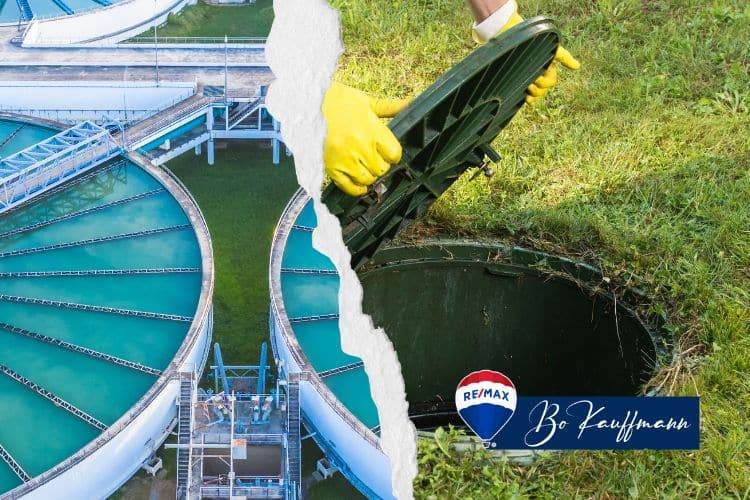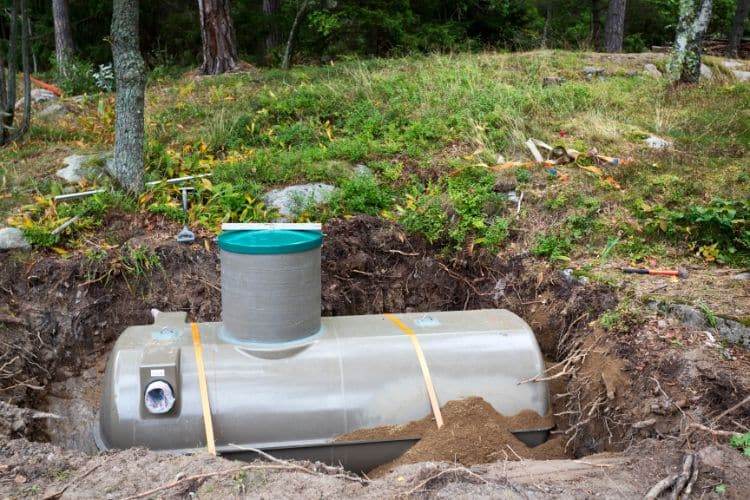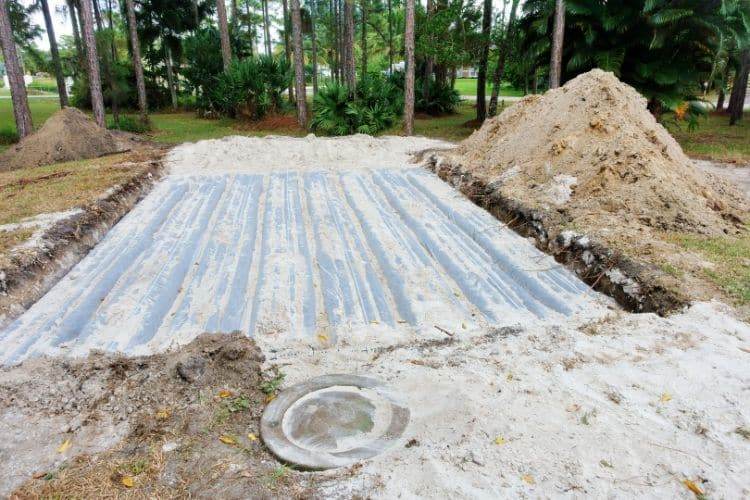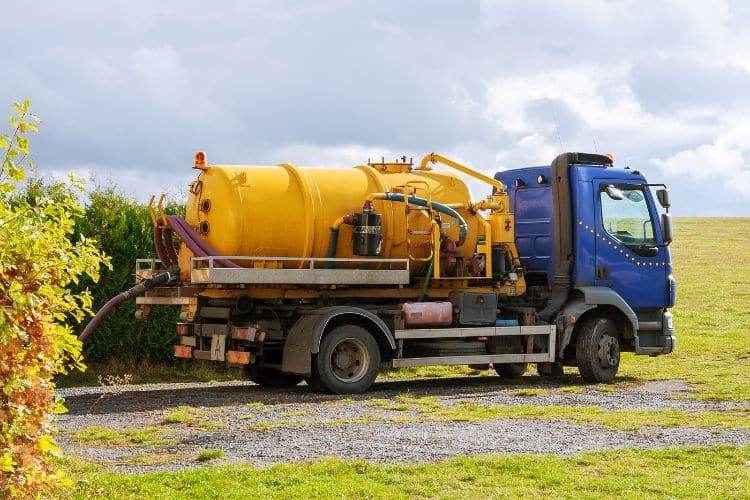Complete Guide to Septic Tank Maintenance – Protect Your Home
If you’re like most homeowners, you probably don’t give your septic system much thought – until something goes wrong. However, proper septic tank maintenance ensures a safe and healthy living environment.
This section will discuss the importance of septic tank maintenance and how it can protect your home. We’ll cover the critical maintenance elements, such as cleaning and pumping the tank and maintaining the septic system.
Key Takeaways:
- Regular septic tank maintenance is essential for a safe and healthy living environment
- Cleaning and pumping the tank, as well as maintaining the overall septic system, are critical elements of maintenance
- Neglecting maintenance can lead to costly repairs and potential health risks
Understanding Your Septic System
Septic systems are essential to any home not connected to a municipal sewer system. The septic system is responsible for treating and disposing wastewater, so it’s necessary to understand how it works and how to maintain it.
Components of a Septic System
A septic system consists of four main components: the septic tank, the drainfield, the pump, and the drain. The septic tank is where wastewater from the home goes first. The solid waste settles at the bottom of the tank, while the liquid waste flows through the outlet pipe to the drain field.
The drainfield is where the liquid waste is treated and disposed of. The pump pumps the wastewater from the septic tank and into the drainfield. The drain is the pipe that carries the treated wastewater out of the drainfield and away from home.
| Component | Description |
|---|---|
| Septic tank | Receives wastewater from the home, separates solid and liquid waste |
| Drainfield | Treats and disposes of liquid waste |
| Pump | Pumps wastewater from the septic tank to the drainfield |
| Drain | Carries treated wastewater out of the drainfield and away from the home |
The Role of Solids
One of the most critical aspects of maintaining a septic system is managing the solids that accumulate in the septic tank. Solid waste is heavier than liquid waste and settles at the bottom of the tank. Over time, the solids accumulate and must be pumped out periodically to prevent them from clogging the drainfield.
It’s important to note that some solids are necessary for the septic system to function correctly. The bacteria in the septic tank require some organic matter to break down and neutralize the waste. However, too much solid waste can overwhelm the system and cause it to malfunction.
Understanding your septic system’s components and solids’ role is crucial for maintaining a healthy and functional design.
Septic Tank Maintenance Tips
Proper maintenance of your septic tank is essential to ensure its long-term functionality. Follow this septic tank maintenance guide to keep your septic system running smoothly.
Septic Tank Maintenance Schedule
Regular septic tank maintenance is required to avoid potential system failure. Create a schedule to plan for inspections and servicing of your septic system. Most septic tanks should be pumped every 3-5 years, depending on usage and tank size. Consult a septic tank maintenance professional to identify the proper schedule for your system maintenance needs.
Septic Tank Maintenance Checklist
Use this septic tank maintenance checklist to ensure that you stay on top of routine maintenance tasks to avoid costly repairs:
- Inspect the septic system annually
- Check the level of the tank and note any odors or backups
- Avoid flushing non-degradable products such as wipes and feminine products
- Dispose of hazardous waste safely and properly
- Monitor water usage and avoid overloading the system
- Ensure regular septic tank cleaning and pumping
- Add premium septic tank tablets to maintain proper bacterial balance.
Septic Tank Maintenance Tips
Here are some additional septic tank maintenance tips:
- Repair any leaking faucets or toilets to prevent excess water in the septic system
- Avoid using garbage disposal as it can lead to clogs in the system
- Do not park or drive heavy vehicles over the drainfield area, as it can compact the soil and damage the system
By following these septic tank maintenance tips and using the septic tank maintenance checklist, you can keep your septic system operating efficiently and avoid costly repairs.
Regular Pumping and Cleaning
Regular septic tank cleaning and pumping are essential to maintain the system’s functionality. Most septic tanks require service every three to five years, depending on tank size and usage factors. Refrain from regular septic tank maintenance to avoid costly repairs and potential health hazards.
While some homeowners attempt to clean their septic tanks, this is generally not recommended. Professionals have the experience and equipment to pump and dispose of the waste safely and efficiently. Hiring a reputable septic tank maintenance service can help ensure the job is done correctly and according to local regulations.
| Frequency of Service | Number of People in the Household | Tank Size |
|---|---|---|
| Every 1-2 years | 2-4 | 750 gallons |
| Every 2-3 years | 4-6 | 1,000 gallons |
| Every 3-5 years | 6-8 | 1,250 gallons |
To find a septic tank maintenance service near you, search online for “septic tank maintenance near me.” Be sure to read reviews and ask for references before hiring any service. Septic tank maintenance costs vary depending on location and tank size, but it is generally less expensive than repairing a malfunctioning system.
Regular septic tank cleaning and pumping are crucial to septic system maintenance. Please pay attention to this critical task and seek professional help when necessary.
Proper Solid Waste Disposal
Proper waste disposal is one of the most important aspects of septic system maintenance. Solids can clog pipes and cause damage to the septic tank, so it’s crucial to know what can and cannot be flushed or disposed of in the garbage disposal.
What to avoid: Do not flush diapers, feminine hygiene products, grease, or any non-biodegradable items down the toilet. Also, avoid using garbage disposals for large food scraps, oils, and fats.
What to do: Dispose of non-biodegradable items in the trash and compostable waste in a compost bin. Spread out water usage throughout the day to prevent overloading the system.
By adequately managing solid waste, you can avoid potential clogs and damage to your septic system. Remember, an ounce of prevention is worth a pound of cure!
 Water Conservation for Septic Systems
Water Conservation for Septic Systems
Conserving water is not only important for the environment, but it also plays a crucial role in septic system maintenance. The less water your household uses, the less strain on the septic system. Here are some practical tips for conserving water:
- Fix leaks promptly. Even a tiny leak can waste gallons of water over time.
- Use efficient appliances, such as washing machines and dishwashers, which use less water per load.
- Install water-saving devices, such as low-flow showerheads and faucet aerators.
- Take shorter showers and turn off the water while brushing your teeth.
- Only run full loads in the dishwasher and washing machine.
- Avoid using the toilet as a garbage can. Flushing non-degradable items, such as cigarettes and facial tissues, can waste gallons of water and clog the system.
By reducing water use, you help extend the life of your septic system and save money on water bills. Remember, regular septic system maintenance combined with water conservation practices is the best way to keep your system functioning correctly.
Maintaining Your Drainfield
The drainfield is an essential septic system component responsible for filtering and purifying the effluent that leaves the septic tank before it returns to the groundwater. Proper drainfield maintenance is vital to ensure your septic system functions correctly and doesn’t pose a risk to the environment and public health.
After having your septic tank pumped, it’s essential to check to ensure no leaks or other issues exist that could cause problems with the drainfield. An excess sludge in the septic tank can move into the drainfield and clog the soil, preventing proper drainage and filtration. This can lead to backups and overflows, causing extensive damage to your property and posing a threat to human health.
Regular inspections of your drainfield will allow you to identify any issues before they become severe. It would be best to keep the area around the drainfield clear of shrubs and other obstructions that could interfere with its proper function.
| Signs of a Drainfield Problem | Possible Cause |
|---|---|
| Water pooling or bubbling on the drainfield | Excess septic tank sludge or a clog in the drainfield |
| Sewage odors in the yard or home | Leaking septic tank or drainfield |
| Lush green grass or vegetation over the drainfield | Effluent leakage from the drainfield |
If you notice any of the above signs, you should take care of it quickly to avoid further damage. Could you contact a professional septic system maintenance company to perform an inspection and make necessary repairs?
By correctly maintaining your drain field and having your septic tank pumped regularly, you can help ensure your septic system functions ideally and doesn’t risk your health and the environment. Taking preventative measures and acting quickly when issues arise will help you save money in the long run and keep your septic system operating efficiently.
Professional Septic Tank Services
While some aspects of septic tank maintenance can be done by yourself, hiring a professional septic service for specific tasks is essential. These professionals have the knowledge and equipment to pump and clean the tank, inspect the system for damage, and make necessary repairs.
When looking for a septic service professional, it is essential to research and choose a reputable company. Ask for recommendations from friends and family, read online reviews, and check the company’s credentials and insurance coverage.
Another essential factor to consider is proximity. Look for septic tank maintenance near me to avoid long travel times and potential delays in emergencies.
Cost is also a factor to keep in mind. While prices will vary depending on your location and the specific services needed, getting multiple quotes and comparing prices before deciding is essential.
 Signs of Septic System Malfunction
Signs of Septic System Malfunction
Septic systems are essential components of homes that are not connected to local sewage systems. Properly maintaining the system is crucial to avoid any malfunction. Neglecting maintenance can result in costly repairs and health risks associated with exposure to wastewater. Here are some signs that indicate your septic system is malfunctioning:
- Odors: Foul odors emanating from your drains, toilets, or outside the home indicate something wrong with your septic system.
- Slow Draining: If your sinks or toilets are draining slowly, it could indicate a clog or a problem with your drain field.
- Backing Up: If you notice sewage backing up into your home, it could be a sign of a severe problem that requires immediate attention.
- Standing Water: It could indicate a leak if you notice standing water or soggy areas in your yard, especially near your septic system.
In addition to these signs, the size of your tank and the amount of water your household uses also impact the frequency of septic system maintenance. On average, septic tanks should be pumped every three to five years, depending on the tank size and household usage. Regular inspections and drinking water quality testing are critical to identifying potential problems before they become major.
Conclusion
Septic tank maintenance may not be the most glamorous topic, but it’s essential to keeping your home and family safe. Following the tips and guidelines outlined in this article can keep your septic system running smoothly for years.
Please keep your septic tank clean and pumped regularly, monitor water usage, and take care of waste properly. These simple steps prevent costly repairs and help ensure your septic system functions correctly.
So, keep your septic in check and protect your home with regular septic tank maintenance. Trust us, it’s worth it!
FAQs about Septic System Maintenance
Q: How can I properly maintain my septic tank and field?
To properly maintain your septic system, it is essential to limit the amount of household waste that goes down the drains, avoid pouring grease or oils down the drain, use water efficiently, and have your system regularly inspected and pumped by a septic professional. Also, adding these bacterial tablets helps keep the system clean.
Q: What is a septic system and how does it work?
A septic system is a wastewater treatment system used in areas not connected to a municipal sewer. It consists of a septic tank and a drainfield. It allows wastewater to separate into different layers, with solids sinking to the bottom of the tank and liquids flowing into the drainfield for further treatment.
Q: How often should I get my septic system inspected?
It is recommended to have your septic system inspected at least once every three years to ensure it is functioning correctly and to identify any potential issues before they become significant problems.
Q: Can I use household chemicals with my septic system?
While some household chemicals may not harm your septic system, it is best to minimize the use of harsh chemicals and avoid pouring them directly into the drains. Household chemicals can disrupt the natural balance of bacteria in the septic tank and potentially harm the delicate ecosystem of the drainfield.
You should, however, add septic pucks regularly. These precisely engineered bacteria pucks help break up the solid waste.
Q: How often do I need to pump out my septic tank?
Septic tank pumping frequency depends on the tank size and the number of people in your household. On average, it is recommended to pump the septic tank every three to five years. However, you must consult a professional to determine your system’s pumping schedule.
Q: What should I do if my septic system gets clogged?
If you suspect a clog in your septic system, it is best to avoid using excessive water and refrain from flushing any additional waste down the toilet or drains. Call a septic professional to assess the situation and address the clog adequately.
Q: What is a leach-field, and why is it essential for a septic system?
A leach field, also known as a drainfield, is a part of the septic system where wastewater is treated and filtered as it is dispersed into the soil. It is essential because it allows the treated wastewater to safely and effectively return to the environment without causing contamination or harm.
Q: Should I keep maintenance records for my septic system?
It is essential to keep maintenance records for your septic system. These records can help track the frequency of inspections and pumping, identify patterns or issues, and provide documentation for any potential future property sale.
 About the Publisher
About the Publisher
Bo Kauffmann is a residential real estate agent with over 18 yrs experience in helping buyers and sellers achieve their goals. Inducted into the REMAX Hall of Fame in 2010 and receiving the REMAX Lifetime Achievement Award in 2019, Bo has sold over 500 houses and condos in the Greater Winnipeg market. He is an accredited buyer representative (A.B.R.) and a Luxury Home Marketing Specialist.
Bo provides exceptional service to First-Time Home-Buyers, Seniors looking to downsize and Home Sellers of all ages.
He can be reached easily By E-Mail or call/text him Call/Text Here
Never miss an episode of our real estate podcast. Install our FREE Podcast App available on iOS and Android. For your Apple Devices, click here to install our iOS App. For your Android Devices, click here to install our Android App. Check my videos on Youtube





